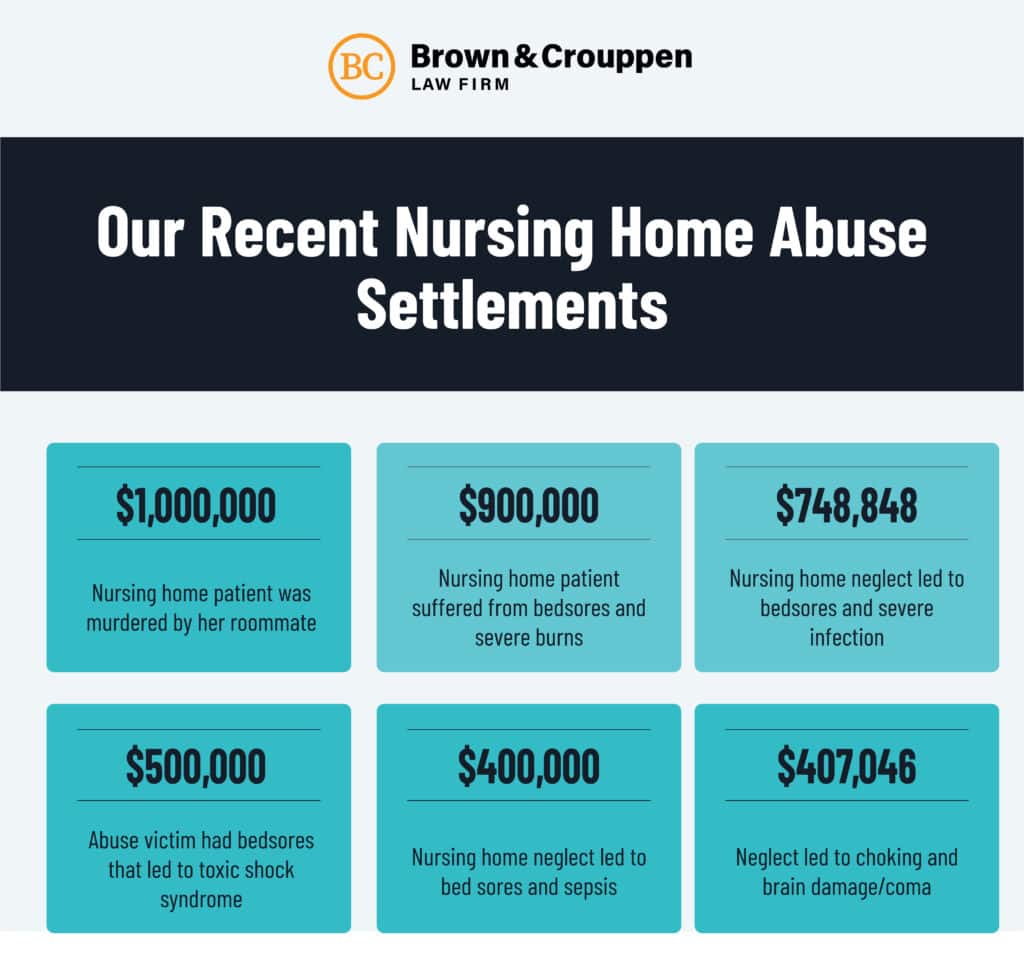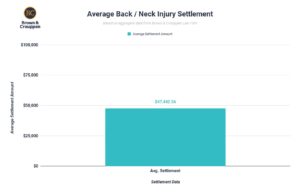-
Common signs of bedsores include blisters, open wounds, and red, warm, and irritated skin. Prevent bedsores by regularly changing a person’s position to alleviate skin pressure. Use pillows or foam wedges to reduce pressure spots.
-
All bedsores can have serious complications, including infections of nearby skin, bones, and joints. The most serious is sepsis, a life-threatening response to infection.
-
Consult a nursing home abuse or neglect lawyer if your loved one is suffering from bedsores in a nursing home.
If you find out that your loved one suffered neglect and abuse in a nursing home, you may find yourself wondering, “Can you die from bedsores?” While often overlooked, bedsores can quickly cause serious infections or death.
If your loved one has developed bedsores while at a nursing home in St. Louis or Kansas City, our nursing home abuse and neglect lawyers will evaluate your potential claim and help protect your loved one’s rights. Contact us by calling 800-536-4357 or filling out our online contact form to schedule a free consultation.
What Are Bedsores?
Bedsores or pressure ulcers are preventable injuries to skin and tissue that develop from prolonged pressure. They can develop quickly and may be challenging to treat. Older adults and individuals with limited mobility are at a higher risk of developing bedsores. Individuals with bedsores have a 4.5 times greater risk of death than persons without. Bedsores can also be a sign of nursing home abuse and neglect.
What Causes Bedsores?
Bedsores arise from sustained pressure on the skin over bony areas, such as the elbows or heels. Pressure in these areas restricts blood flow and causes cells to die, forming ulcers. Skin friction and dryness may also cause some sores.
Bedsores in nursing homes are often caused by a lack of care and attention from staff. They may develop from abuse or neglect when staff:
- Fails to reposition residents who are bedridden or have limited mobility
- Neglects nutritional needs
- Fails to keep skin clean and dry
- Fails to monitor and treat pressure spots
We are a full-service personal injury law firm with the skills and resources needed to conduct a thorough, independent investigation into what caused your loved one’s bedsores. When someone is injured because their nursing home failed to provide proper care and attention, our attorneys can fight to hold that nursing home accountable.
How Long Can Someone Live With a Bedsore?
Bedsore effects vary significantly. Factors influencing how long someone can live with a bedsore include the severity of the sore, how long it has been present, and whether there is a treatment plan. The progression of sores can be dramatically different from one person to another. Nursing homes and healthcare professionals should take all bedsores seriously, as improper treatment can have fatal consequences.
How Long Does It Take To Get Bedsores?
Bedsores develop differently for everyone. How long it takes to get bedsores depends on each person’s health, mobility, and skin. Immobility is a major risk factor that will cause sores to develop more quickly, especially if someone is confined to a bed or wheelchair. Elderly individuals are also at a heightened risk due to thinned skin and underlying health issues.
Bedsores develop in four stages, ranging from mild to severe:
Stage One
At this stage, the skin is not broken but shows signs of redness, which may not fade after removing pressure. The affected area may be painful, firm, or warmer than the surrounding skin.
Stage Two
During stage two, the loss of the skin’s outer layer becomes apparent. A shallow open sore or blister is often noticeable. Surrounding skin is red or discolored. The area is normally also painful and shows signs of infection.
Stage Three
The skin has an open sore that extends into the underlying tissue, forming a deep wound. This wound may extend down to the muscle. Dead tissue may be present. The depth and severity of stage three bedsores will depend on the location of the sore.
Stage Four
Stage four bedsores, also known as stage four sacral ulcers, are the most serious and life-threatening. At this stage, deep wounds reach into muscle and bone, causing extensive and sometimes permanent damage.
Common Sites of Pressure Ulcers
Pressure ulcers may develop anywhere on the body but are most common at pressure points between skin and bones. The most frequent sites include the:
- Tailbone
- Hips
- Heels
- Ankles
- Elbows
- Shoulders
- Back
- Ears
Pressure Ulcer Complications
Any pressure ulcer can have serious complications, including infections of nearby skin, bones, and joints. This may also cause redness and swelling over the affected area.
One of the most common complications caused by severe pressure ulcers is sepsis, which is a life-threatening response to an infection that may cause shock or death if not treated promptly. Our nursing home abuse lawyers in St. Louis and Kansas City will help you initiate legal action for a sepsis-related injury or death at nursing homes.
Pressure Sore Treatment
Treatment for a pressure sore will depend on its stage, but the primary goal is always to relieve pressure on the area and dress the wound so it can heal. Advanced sores may require surgical cleaning and debridement of infected tissues. Medical providers may also need to prescribe pain medication for sore-related pain. Physical therapists may then work to improve an individual’s mobility to prevent new sores from developing.
Bedsore Prevention
Preventing bedsores is critical for older adults and those with limited mobility. Effective prevention can reduce the incidence of bedsores and complications that follow. Nursing home staff, healthcare providers, and residents can help by:
- Changing a person’s position regularly
- Using pillows, foam wedges, or special support surfaces to offload pressure points
- Maintaining clean skin and applying moisturizers
- Inspecting the skin daily for signs of pressure damage
- Encouraging mobility to improve circulation
- Keeping skin free from excessive moisture and sweat
- Educating patients, families, and caregivers about the risks of bedsores
When To Take Legal Action
Deciding when to take legal action for bedsores is a tough decision, particularly when loved ones in nursing homes are involved. There are numerous signs of nursing home abuse and neglect to look out for. If you spot any, it may be time to take action. They include:
- Bruises, welts, abrasions, lacerations
- Failure to follow nursing home protocols
- New, untreated, or worsening bedsores or pressure ulcers
- Serious complications such as sepsis
Our team will advise you on what to do if you suspect nursing home abuse. We’ll handle all aspects of your case, from filing a lawsuit before the statute of limitations passes to negotiating a fair nursing home abuse and neglect settlement.
We can give you a good idea of how long your case will take to resolve after evaluating the circumstances in your free consultation.


Were you injured in an accident due to someone else’s negligence? Get legal help from the most effective injury law firm in the Midwest.
Types of Compensation for Victims of Nursing Home Abuse and Neglect
Victims of nursing home abuse and neglect may be entitled to various types of compensation, depending on the specifics of their case and injuries. Different forms of compensation may include:
- Medical expenses – Victims may be eligible to recover medical costs associated with treating injuries caused by abuse or neglect. This can include past, present, and future bills for services such as hospitalizations, surgeries, or physical therapy.
- Pain and suffering – Victims may recover compensation for pain and emotional distress caused by abuse or neglect.
- Loss of quality of life – Abuse and neglect can diminish one’s happiness and independence. Victims may recover compensation for the negative impact the abuse or neglect has had on their quality of life.
- Wrongful death – Neglect or abuse may be fatal. In Missouri, certain family members may pursue compensation when such conduct results in the death of a loved one.
- Punitive damages – Punitive damages are awarded to punish a nursing home or wrongdoer for malicious or egregious conduct.
Our nursing abuse lawyers will evaluate your potential compensation and fight to protect your loved one’s rights.

Why Hire a Lawyer if a Loved One Is Experiencing Nursing Home Abuse and Neglect?
Hiring a lawyer if a loved one is experiencing nursing home abuse or neglect will protect their rights to justice and compensation. Our team will help you understand your legal options, gather evidence, interview witnesses, retain experts, and build a strong case to hold the nursing home accountable.
With more than $1 billion in settlements and verdicts for our clients, our team of over 250 legal professionals has 40+ years of experience defending the rights of injury victims. Recognized as the Best Law Firm in St. Louis by the St. Louis Post-Dispatch, we have developed a strong reputation for success.
Call 800-536-4357 or contact us online for a free consultation. There are no upfront costs or legal fees. We only get paid if you win.







